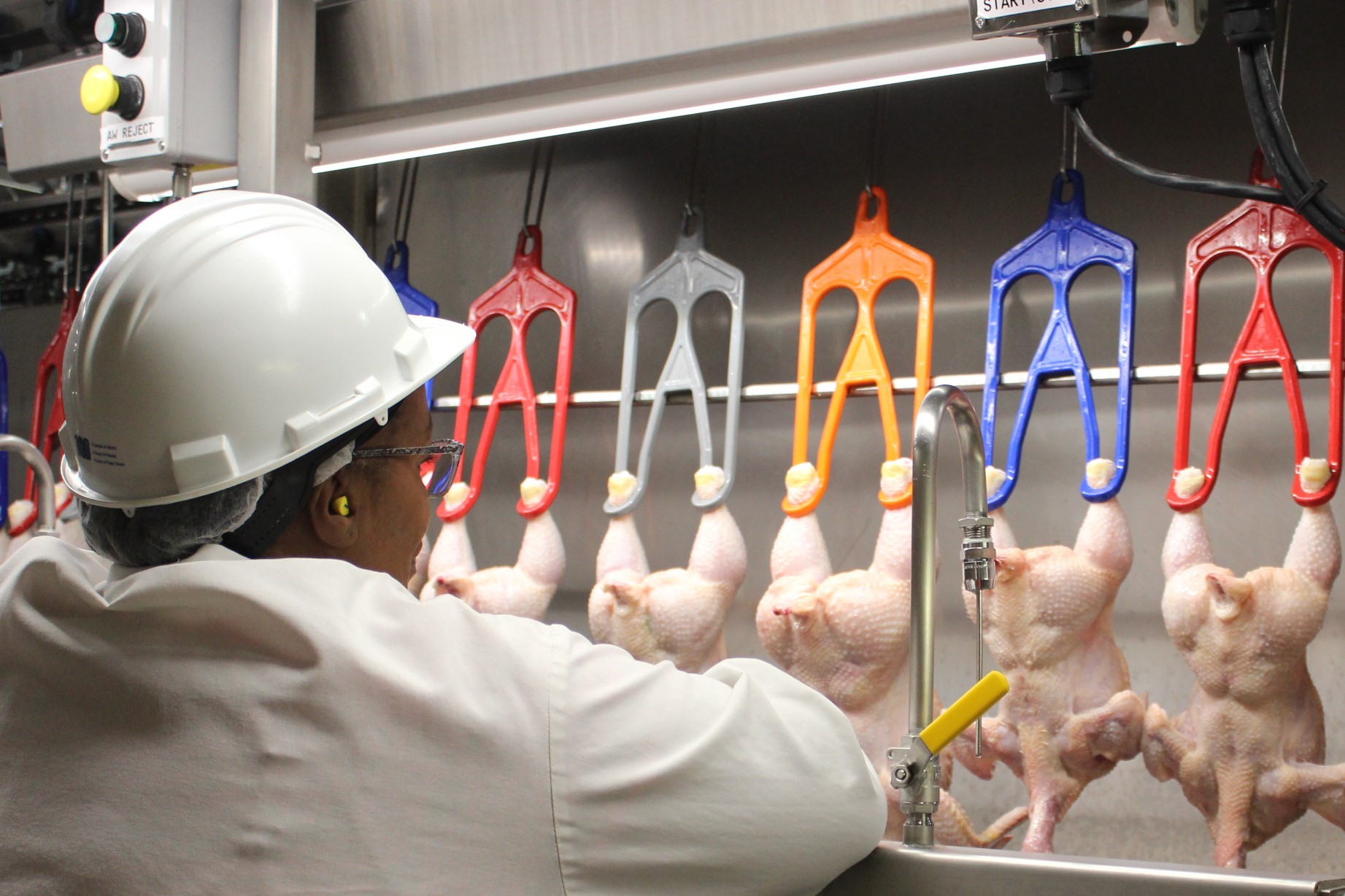
FSIS Import Procedures for Meat, Poultry & Egg Products
USDA's Food Safety and Inspection Service (FSIS) is responsible for ensuring that domestic and imported meat, poultry, and egg products are safe, wholesome, and accurately labeled. Foreign countries that export meat, poultry, and egg products to the United States are required to establish and maintain inspection systems that are equivalent to those of the United States. FSIS audits foreign inspection systems and reinspects meat and poultry at the port-of-entry to ensure that foreign countries have maintained equivalent inspection systems.
FSIS makes two types of equivalence determinations:
- determinations of initial equivalence (termed "eligibility") for countries that are not yet trading partners, and
- determinations of whether equivalence is being maintained by countries that are currently eligible.
Country Eligibility
Foreign countries undergo a stringent review process before they become eligible to export meat, poultry, or egg products to the United States. Countries are not required to adopt an identical inspection system, rather they must have an equivalent one. The evaluation of a country's inspection system to determine eligibility involves two steps: a document review and an on-site audit.
The document review is an evaluation of the country's laws, regulations, and other written information, focusing on five risk areas:
- sanitation controls,
- animal disease controls,
- slaughter and processing controls,
- residue controls, and
- enforcement controls.
If the document review process shows the country's system to be equivalent, a technical team will visit the country to evaluate the five risk areas as well as other aspects of the inspection system including plant facilities and equipment, laboratories, training programs, and in-plant inspection operations. These on-site audits are used to verify that countries have implemented inspection programs properly, and if not, resolve differences and clarify requirements.
If FSIS deems the inspection system to be equivalent to the U.S. system, a proposed rule is published in the Federal Register announcing the determination and the intent of FSIS to list the country as eligible to export meat, poultry, or egg products to the United States. After consideration of public comments, a final decision is made on country eligibility and, if favorable, a final rule is issued. That foreign country's inspection system is then responsible for certifying individual exporting establishments to FSIS and for providing annual re-certification documentation. FSIS regularly conducts on-site audits of the eligible foreign inspection systems to ensure they remain equivalent to the U.S. system.
Occasionally, some circumstances could result in the suspension of eligibility and an interruption of trade. One example is if an emergency sanitary measure is implemented by FSIS to address a hazard that is so severe that no product can enter the marketplace from a foreign establishment until the control is in place. A second situation could be if an exporting country does not provide satisfactory documentation of an equivalent sanitary measure. A third example could be if a system audit reveals that an exporting country is not implementing a public health sanitary measure in the manner that FSIS initially determined to be equivalent.
Permanent withdrawal of eligibility, like initial approval of eligibility, can only be accomplished by rulemaking. FSIS may, however, take action to ensure that products from a particular country are not admitted into the United States if they are adulterated or misbranded based on specific findings during on-site audits, because of port-of-entry reinspection failures, or other means.
Import Certification
Foreign inspection certificates are required to accompany all imported meat, poultry, and egg products. These certificates must indicate the product name, establishment number, country of origin, name and address of the manufacturer or distributor, quantity and weight of contents, list of ingredients, species of animals it was derived from, and identification marks. The certificate must also bear the official seal of the foreign government agency responsible for the inspection along with the signature of an agency official. This certificate must be in both English and the language of the foreign country.
U.S. Customs and Border Protection
Importers of any merchandise into the United States must file an entry form with U.S. Customs and Border Protection (CBP) within five working days after the shipment arrives at a U.S. port-of-entry. For meat and poultry shipments, FSIS requires that two additional documents — the original certificate from the country-of-origin indicating the product was inspected and passed by the country's inspection service and is eligible for export to the United States, and an import inspection application and report. CBP also requires the importer to post a bond, usually an amount to cover the value of the shipment plus duties and fees. Meat and poultry shipments remain under bond and subject to recall by CBP until FSIS notifies them of the results of the reinspection.
An entry form is not required for shipments of egg products and shell eggs intended for breaking but an import request form must be submitted for approval before these products can be exported to the United States.
Reinspection at Port-of-Entry
Upon arrival at a U.S. port-of-entry, all meat and poultry shipments must be reinspected by an FSIS import inspector before they are allowed into this country. Every lot of product is given a visual inspection for appearance and condition, and checked for certification and label compliance. In addition, the Automated Import Information System (AIIS) assigns various other types of inspection including product examinations and microbial and chemical laboratory analysis. Egg products are reinspected at the facility where they are taken for further processing. About 65 FSIS inspectors carry out reinspection at approximately 150 official import establishments.
Shipments that pass reinspection are allowed to enter U.S. commerce and are treated as domestic product. Shipments from all countries except Canada are stamped with the official USDA mark of inspection. Canadian shipments carry the Canadian mark of inspection and an export stamp. If a shipment does not meet U.S. requirements, the containers are stamped "U.S. Refused Entry," and within 45 days must be exported, destroyed, or converted to animal food, if an appropriate request for diversion is approved by FDA.
For imported egg products, the first 10 shipments from each foreign plant is tested at the destination facility to establish a history of compliance. This rate is reduced to a random selection of one in eight production lots as long as the product continues to be in compliance. Each production lot is subject to an organoleptic inspection, as well as the evaluation of labeling.
Residue & Microbial Testing
In order to export to the United States, a foreign country must have a residue control program with standards equivalent to U.S. standards. Statutes require that foreign residue control programs include:
- random sampling of animals at slaughter,
- the use of approved sampling and analytical methods,
- testing of appropriate target tissues for specific compounds, and
- testing for compounds identified by the USDA or the country-of-origin as potential contaminants.
FSIS randomly samples meat, poultry, and egg products for violative chemical residues under the National Residue Program. The compounds included in the import residue plan reflect the testing done in the U.S. domestic residue program. FSIS can initiate a special sampling plan when there is a need to monitor a country for residues of a specific compound, based on detection of violative residues at U.S. port-of-entry or other information concerning risk to human health. Decisions about product acceptability are based on U.S. tolerances or action levels.
Microbial testing is also conducted on imported meat and poultry products. The microbial testing plan for imported products, like that for residues, is modeled after the microbial testing plan for domestic products. Assignment for sampling product lots is generated through the AIIS. Different products are tested for different pathogens:
- Ready-to-eat meat and poultry products are subject to testing for Listeria monocytogenes and Salmonella at a random rate.
- Dried and semi-dried fermented sausages are randomly sampled for E. coli O157:H7, Listeria monocytogenes, Staphylococcus aureus enterotoxin and Salmonella.
- Raw ground beef and raw ground beef components are randomly sampled for E. coli O157:H7.
Random samples from each production lot of imported, pasteurized egg products are tested for Salmonella. In addition, pasteurized, liquid egg products in small, intact containers (up to 5 pounds), that bear a shelf life claim may also be tested for Listeria monocytogenes. Unpasteurized egg products are subject to random testing for the presence of residues only. Additional testing could be initiated if a public health problem is identified.
If a residue or microbial violation occurs in meat, poultry or egg products, the frequency of inspection is increased for all shipments of similar product from the violative foreign establishment until a record of compliance is re-established.
Inspection of Product Labels
FSIS import inspectors check labels on both shipping containers and retail-size packages. Labels on retail packages of meat or poultry shipped to the United States must meet U.S. labeling requirements. Product labels must be in English and must include:
- product name;
- foreign establishment number and country-of-origin shown directly under the product name;
- name and address of the manufacturer or distributor;
- net quantity of contents in pounds and ounces or liquid measure;
- list of ingredients; and
- if applicable, safe handling instructions and nutrition information.
Import Statistics
In fiscal year 2008, FSIS inspected 3.3 billion pounds of imported meat and poultry from 29 countries, most of which was fresh and processed meat; only a small amount of poultry was imported. This represented less than 10 percent of the domestic meat supply. During fiscal year 2008, a total of 21.7 million pounds of egg products were imported from Canada, the only country that exports egg products to the United States.



